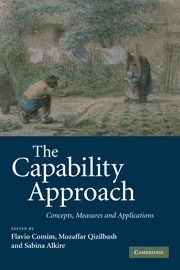Book contents
- Frontmatter
- Contents
- List of figures
- List of tables
- List of contributors
- List of acronyms
- Acknowledgements
- Introduction
- 1 Using the capability approach: prospective and evaluative analyses
- PART I Concepts
- PART II Measures
- 7 Do concepts matter? An empirical investigation of the differences between a capability and a monetary assessment of poverty
- 8 Social exclusion in the EU: a capability-based approach
- 9 Complexity and vagueness in the capability approach: strengths or weaknesses?
- 10 Operationalising Sen's capability approach: the influence of the selected technique
- 11 Operationalizing capabilities in a segmented society: the role of institutions
- PART III Applications
- Index
- References
10 - Operationalising Sen's capability approach: the influence of the selected technique
Published online by Cambridge University Press: 22 September 2009
- Frontmatter
- Contents
- List of figures
- List of tables
- List of contributors
- List of acronyms
- Acknowledgements
- Introduction
- 1 Using the capability approach: prospective and evaluative analyses
- PART I Concepts
- PART II Measures
- 7 Do concepts matter? An empirical investigation of the differences between a capability and a monetary assessment of poverty
- 8 Social exclusion in the EU: a capability-based approach
- 9 Complexity and vagueness in the capability approach: strengths or weaknesses?
- 10 Operationalising Sen's capability approach: the influence of the selected technique
- 11 Operationalizing capabilities in a segmented society: the role of institutions
- PART III Applications
- Index
- References
Summary
Introduction
A major feature of Sen's theory, characterising well-being as a rich and multifaceted concept, unquestionably lies in its conforming to intuitive notions of what it means to be better off or worse off. Essentially, this account confronts anybody who is willing to assign some kind of concrete shape to functionings and capabilities with a frame of analysis involving, however, analogous issues if compared with the concepts of the living standard traditionally used in practical work. In spite of this, when it comes to working definitions and measurements, its informational richness is often regarded as a worrisome feature.
The existing applications have nevertheless proven to be rather fruitful in terms of the array of suggested techniques. As Atkinson (1999: 185) has stressed, ‘there is more than one way in which an idea of this kind [Sen's framework] can be operationally effective’. Focusing on micro applications, the literature has been basically ranging in between the use of simple descriptive statistics, multivariate methods and the ‘fuzziness’ approach. The adoption of the two latter methodologies has been repeatedly endorsed by Sen himself (1990, 1994 and 1996), emphasising their suitability for his framework. Accordingly, most applications nowadays rely on either of the two techniques.
Meanwhile, increasing attention has been devoted to Sen's approach – at least in some countries – and also by public institutions.
Information
- Type
- Chapter
- Information
- The Capability ApproachConcepts, Measures and Applications, pp. 310 - 361Publisher: Cambridge University PressPrint publication year: 2008
References
Accessibility standard: Unknown
Why this information is here
This section outlines the accessibility features of this content - including support for screen readers, full keyboard navigation and high-contrast display options. This may not be relevant for you.Accessibility Information
- 15
- Cited by
